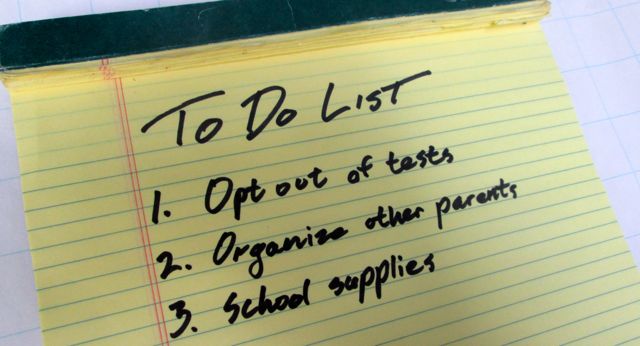By Denisha Jones.
As many parents prepare to send their child(ren) off to school this year they are hopeful that their children will return home each day with reports that they learned something new or made a new friend. Unfortunately for many parents their children will come home and report that they spent the day preparing for tests. The days will turn into weeks, and in some cases, students will spend an entire month or more preparing for high states standardized tests (HSST). If your child is a good test taker and enjoys spending all day immersed in test prep then consider yourself lucky because your child will probably not come home complaining of being bored all day. For many children the increased amount of time spent preparing for tests will leave them feeling drained, fearful, or downright apathetic. Many parents have noticed that the increase in testing has also led to an increase in teaching to the test. We all took tests when we were in school but they lasted about a week and very rarely did we spend months preparing to take the tests. Today we are told that the tests are necessary to close the achievement gap, hold teachers accountable, and make our children college and career ready. But at what cost to our children should we subject them to an insane testing culture?
Assessment is part of the teaching and learning cycle. A teacher must assess students to see what they know, what they learned, and what areas they need further instruction. Assessment should be used to improve upon teaching by assisting teachers in planning instructional activities that will help students achieve academic goals. However, today high stakes assessments are used to punish students, teachers, schools, and communities. Data walls that broadcast student test scores have become the norm in many schools and often stigmatize and marginalize students who do not score well. Many states have turned standardized assessments into high stakes assessments by mandating that students must past a single test to be promoted to the next grade and to graduate from high school. Teachers across the country are being evaluated based on their students’ test scores while schools with low scores are labeled failing and even closed in many low-income and minority communities. This abuse of assessments has led many teachers, parents, and students to demand an end to HSST and the devastating effects they are having on public education.
Even though parents, students, and teachers are voicing their concerns that the current obsession with testing is detrimental to improving the academic achievement of all students’ policy makers and elected officials have been slow to listen to these voices. In the meantime our children’s educative years are in jeopardy if we do not take action to put a stop to the unethical use of assessment. Instead of waiting for others to realize the danger our education system is in we can make a choice to opt out of all high stakes testing. United Opt Out (UOO) is a national group whose mission is to “…to end the practice of punitive high-stakes and related activities that are fraudulently being used as ‘proof’ of the incompetence of public/education teachers.” UOO has created state guides that explain how parents, students, and teachers can legally opt out of all high stakes testing in their state. By opting out you are acknowledging that HSST are not the best way to measure how your child learns and that assessments should not be used to punish students, teachers, schools, and communities. When students and parents opt out of HSST they demonstrate their beliefs that teachers should be trusted to assess students learning without the intrusion of for profit testing corporations. More importantly, when we opt out and support others in opting out, we are doing our part to make sure school is place where learning is valued, achievement is nurtured, and students are engaged. For more information on opting out visit www.unitedoptout.com.
Denisha Jones has a PhD in Curriculum and Instruction from Indiana University. She has taught kindergarten, preschool, served as a campus based preschool director, and taught college for over 10 years. Currently she is a Visiting Assistant Professor of Early Childhood Education at Howard University. Her research interests include service-learning, dealing with challenging behaviors, the de-professionalization of teaching, and promoting diversity in education.





howardat58
Hear, hear!! This whole testing thing has got really out of hand.
OPT OUT NOW!